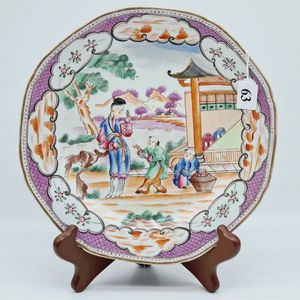Chinoiserie Ironstone Plate with Masonic Design
Masons plate, an early ironstone plate with hand painted chinoiserie decorations
You must be a subscriber, and be logged in to view price and dealer details.
Subscribe Now to view actual auction price for this item
When you subscribe, you have the option of setting the currency in which to display prices to $Au, $US, $NZ or Stg.
This item has been sold, and the description, image and price are for reference purposes only.
- Chinoiserie - Furniture and decorative items decorated in imitation of a Western interpretation of the Chinese style. The Chinoiserie style first became popular in the late 17th century, though there were frequent revivals, notably by Chippendale (hence 'Chinese Chippendale') during the Regency period, and the Anglo-Japanese style in the second half of the 19th century.
The ubiquitous 'willow pattern' is the most common 'Chinese' theme used in porcelain, while on furniture the Chinoiserie style usually has black or red painted and lacquered decoration, though the hallmark of the furniture style is the use of fretwork in geometrical patterns, pagodas and other decorative forms.
Japonaiseries, as the name implies, are motifs in imitation of the Japanese taste.
See also "Chinese Chippendale". - Ironstone China - Credit for the invention of ironstone china is generally accorded to Charles Mason in 1813. Charles Mason was one of the two sons of Miles Mason who founded the Mason works in 1802, and ran the business with his brother George Mason.
Ironstone was a heavy hard earthenware which was slightly translucent, its strength supposedly coming from a very small quantity of iron slag added to the mixture. The additional strength enabled the company to make larger objects that were not susceptible to breakage.
The company manufactured dinner wares, toilet sets, tureens, jugs and so on, and the most popular patterns were blue and white, floral and Oriental Imari style colours.
The trade name "Patent Ironstone China" was registered by the company in 1813, but the patent was only valid for 14 years and was not renewed, enabling other potteries to use the word "ironstone" in describing their wares.
Mason wares are generally well marked with "Mason's Patent Ironstone China" .
This item has been included into following indexes:
